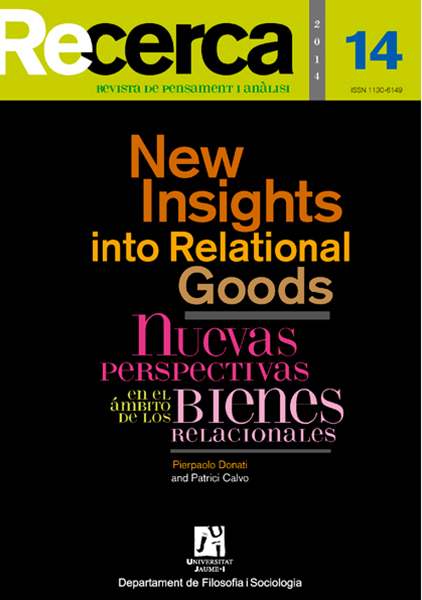Justicia relacional como circulo virtuoso
Contenido principal del artículo
Resumen
La idea de justicia relacional, que conecta el mundo del Derecho con el giro relacional de la Sociología, de Pierpaolo Donati, al tiempo que incorpora la noción económica de reciprocidad de Luigino Bruni, pretende analizar la realidad jurídica en base a tres elementos, propios de un enfoque relacional interdisciplinar: institucionalidad, reciprocidad y socialidad. Por ello, el libro Le nuove virtú del mercato nell’era dei beni comuni (Bruni, 2012) constituye una oportunidad óptima para presentar la justicia relacional, precisando su sentido, en conexión con la idea de virtud y, más concretamente, con la buena fe. Este estudio alude, pues, a la justicia relacional, como categoría concreta de justicia, como nota presente –o ausente– en la relación jurídica, y como explicación del cierre del círculo virtuoso de la justicia (o, por el contrario, el círculo vicioso de la injusticia) en la relación.
The idea of relational justice, which connects the world of Law with the relational turn of Sociology, of Pierpaolo Donati, while incorporating the economic notion of reciprocity of Luigino Bruni, attempts to analyze the legal reality based on three elements, typical of an interdisciplinary relational approach: institutionality, reciprocity and sociality. Therefore, the book Le nuove virtu del mercato nell’era dei beni comuni (Bruni, 2012) is a unique opportunity to present relational justice, specifying its meaning, in connection with the idea of virtue and, more specifically, with good faith. This study refers, then, to relational justice, as a particular category of justice, as a present – or absent – feature in the legal relationship, and as an explanation for the closing of the virtuous circle of justice (or, conversely, the vicious circle of injustice) in the relationship.
Descargas
Detalles del artículo
Citas
Aristóteles (2001): Ética a Nicómaco [Introducción, traducción y notas de José Luis Calvo Martínez], Madrid, Alianza Editorial.
Baird, D. G. y otros (1994): Game Theory and the Law, Cambridge-usa y Londres, Harvard University Press.
Bruni, L. (2012): Le nuove virtù del mercato nell’era dei beni comuni, Roma, Città Nuova.
— (2006): Reciprocità. Dinamiche di cooperazione, economia e società civile, Milán, Bruno Mondadori.
Caro-Gándara, R. (2013): «En la secular búsqueda europea de un paradigma de justicia contractual: el enfoque de justicia relacional» en Sánchéz-Lorenzo, S. (ed.) (2013): Derecho contractual comparado. Una perspectiva europea y transnacional. Estudios, Madrid, 2.ª ed., Civitas.
Cortázar, R. (1997): «Non-Redundant Groups, the Assurance Game and the Origins of Collective Action», Public Choice, vol. 92, pp. 41-53.
Donati, P. (2006): Repensar la sociedad, Madrid, Ediciones Internacionales Universitarias sa.
García-Ruiz, P. (2000): «Antecedentes de la Socioeconomía: individuo y comunidad en el proyecto sociológico de Parsons», Anthropos (monográfico sobre Socioeconomía), 188, pp. 111-123.
— (2006): «Presentación» en Donati, P. (2006): Repensar la sociedad, Madrid, Ediciones Internacionales Universitarias.
Gurvitch, G. (1932): L’idée du droit social, París, Sirey (reimpresión 1972, París, Scientia Verlag Aalen).
Hardin, G. (1968): «The Tragedy of the Commons», Science, 162, pp. 1243-1248.
Jassen, M. (2001): «On the principle of coordination», Economics and Philosophy, vol. 17, 2, pp. 221-234.
Márquez-Prieto, A. (2008): Repensar la justicia social. Enfoque relacional, teoría de juegos y relaciones laborales en la empresa, Pamplona, Thomson-Aranzadi.
— (2010): Calidad ambiental de las relaciones laborales, Granada, Comares.
Martínez-Coll, J. C. (1986): Bioeconomía, Málaga, Servicio de Publicaciones de la Universidad de Málaga.
Parsons, T. (1937): The Structure of social action, Nueva York, McGraw Hill.
Rousseau, J. J. (1754, 1985): Discours sur l’origine et les fondements de l’inégalité parmi les hommes, París, Bordas.
Santalucia, B. (1998): Diritto e proceso penale nella antica Roma, Milán, Giuffrè.
Schiavone, A. (2005): Ius. L’invenzione del diritto in Occidente, Turín, Einaudi.
Skyrms, B. (2007): La caza del ciervo y la evolución de la estructura social, Barcelona, Melusina.
Stanford Encyclopedia of Philosofy (2004): «Games Theory and Ethics» [http://plato.stanford.edu/entries/game-ethics/].
Supiot, A. (2005): Homo juridicus. Essai sur la fonction antropologique du Droit, París, Seuil.
Teubner, G. (2005): La cultura del Dirittonell’epoca della globalizzazione. L’emergere delle costituzioni civili, Roma, Armando Editore.


